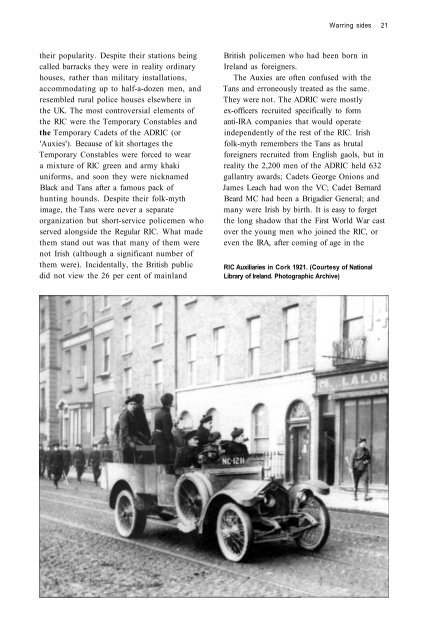You also want an ePaper? Increase the reach of your titles
YUMPU automatically turns print PDFs into web optimized ePapers that Google loves.
<strong>War</strong>ring sides 21<br />
their popularity. Despite their stations being<br />
called barracks they were in reality ordinary<br />
houses, rather than military installations,<br />
accommodating up to half-a-dozen men, and<br />
resembled rural police houses elsewhere in<br />
the UK. <strong>The</strong> most controversial elements of<br />
the RIC were the Temporary Constables and<br />
the Temporary Cadets of the ADRIC (or<br />
'Auxies'). Because of kit shortages the<br />
Temporary Constables were forced to wear<br />
a mixture of RIC green and army khaki<br />
uniforms, and soon they were nicknamed<br />
Black and Tans after a famous pack of<br />
hunting hounds. Despite their folk-myth<br />
image, the Tans were never a separate<br />
organization but short-service policemen who<br />
served alongside the Regular RIC. What made<br />
them stand out was that many of them were<br />
not <strong>Irish</strong> (although a significant number of<br />
them were). Incidentally, the British public<br />
did not view the 26 per cent of mainland<br />
British policemen who had been born in<br />
Ireland as foreigners.<br />
<strong>The</strong> Auxies are often confused with the<br />
Tans and erroneously treated as the same.<br />
<strong>The</strong>y were not. <strong>The</strong> ADRIC were mostly<br />
ex-officers recruited specifically to form<br />
anti-IRA companies that would operate<br />
independently of the rest of the RIC. <strong>Irish</strong><br />
folk-myth remembers the Tans as brutal<br />
foreigners recruited from English gaols, but in<br />
reality the 2,200 men of the ADRIC held 632<br />
gallantry awards; Cadets George Onions and<br />
James Leach had won the VC; Cadet Bernard<br />
Beard MC had been a Brigadier General; and<br />
many were <strong>Irish</strong> by birth. It is easy to forget<br />
the long shadow that the First World <strong>War</strong> cast<br />
over the young men who joined the RIC, or<br />
even the IRA, after coming of age in the<br />
RIC Auxiliaries in Cork 1921. (Courtesy of National<br />
Library of Ireland. Photographic Archive)



